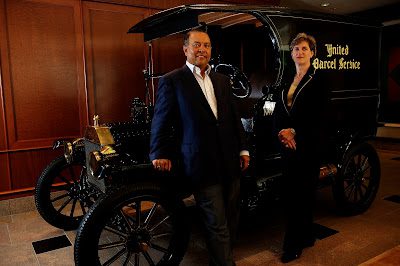Here’s a hefty task for any learning organization: build a learning strategy to reach roughly 400,000 employees in more than 220 countries and territories. This is the challenge United Parcel Service Inc. (UPS) faces every day, and since shifting its leadership development strategy to encompass a broader framework and culture of learning, the Atlanta-based package delivery firm appears to be managing well.
Employee development always has been a large part of UPS, which has been around for more than 100 years. UPS has provided employees with formalized training courses since the 1960s; before that, informal mentoring and coaching was the norm. Each was dedicated to advancing its business leaders’ development, a mindset still relevant today, according to Anne Schwartz, UPS’ vice president of global leadership and talent.
Roughly five years ago the company embarked on a new learning and leadership development strategy to consolidate its online learning ecosystem and continue its tradition of employee development, with an emphasis on global reach. “What makes [our learning strategy] so effective today is that it’s a collaborative group working within a framework,” Schwartz said. “And it’s coordinated. When I took over this job we had between 36-41 learning management systems. Today we have one.”
The company’s learning framework helps to identify how it deploys classroom and Web-based training as well as blended learning platforms. “We now have virtual classrooms that we did not have before,” Schwartz said. “So within this framework, we’ve leveraged technology to make training and development available to literally all of our employees globally 24/7.”
The learning and development framework at UPS seeks to instill nine core leadership competencies: integrity, customer focus, business and financial acumen, breadth of perspective, managing for results, communication and influence, decision making and problem solving, development orientation and partnership. Within this framework is the UPS Global Learning Network, a set of development offerings for specific job competencies within the company.
“It’s about getting the right training for the right people at the right time, so that we’re not painting everybody with the same brush,” said Mary Kay Kopp, UPS’ global learning network director, echoing the strategy’s tagline.
Since starting the five-year strategy in 2009, UPS has transformed how it does leadership development, Schwartz said. In 2009 the company’s learning function put about 2,800 employees through instructor-led courses, with another 15,000 or so doing Web-based training. “Fast forward to 2012; we’re going to hit 37,000 people globally in instructor-led virtual classroom and learning products in this new framework … for less than 50 percent of the cost,” Schwartz said.
Further, by implementing Jack Phillips’ ROI model for its key training programs, UPS has been able to measure the effectiveness of its highest-profile learning programs. For example, its “Building Relationships” workshop had its benefits tabulated from impact data, cost data and time cost data, all gathered from managers, mentors, facilitators and its ROI analysis team.
The most recent ROI analysis showed increases in many of the nine leadership development competencies: Financial acumen showed a 53 percent improvement in costs per package; customer focus, 52 percent improvement; internal business process, 49 percent; and development and growth, 62 percent.
“We stay ahead of the curve by staying aligned to the business priorities and being tied to senior-most leadership,” Schwartz said.
She said because its current learning strategy is nearing its end, UPS’ leaders will soon meet to devise a strategy for the next five years.
The next strategy will continue to promote a consolidated, easy-to-use learning ecosystem, and a branded learning portal called UPS University is part of that.
“We know that in order to be tied to the business, we need [the learning systems] to be organized where the employee can find it in a fashion that meets their needs,” Schwartz said. “And that’s what UPS University will provide.”
Frank Kalman is associate editor of Chief Learning Officer magazine. He can be reached at fkalman@CLOmedia.com.















